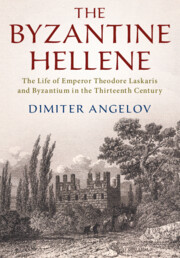Book contents
- The Byzantine Hellene
- The Byzantine Hellene
- Copyright page
- Dedication
- Contents
- Illustrations
- Maps
- Tables
- Acknowledgments
- List of Historical Figures
- List of Rulers in Byzantium and Beyond
- Author’s Note
- Introduction
- 1 Byzantium in Exile
- 2 “The Holy Land, My Mother Anatolia”
- 3 “I Was Raised as Usual for a Royal Child”
- 4 Pursuit of Learning
- 5 Power-Sharing
- 6 Friends, Foes, and Politics
- 7 Elena and the Embassy of the Marquis
- 8 Sole Emperor of the Romans
- 9 The Philosopher
- 10 The Proponent of Hellenism
- Epilogue
- Notes
- Book part
- Bibliography
- Index
Epilogue
Published online by Cambridge University Press: 15 July 2019
- The Byzantine Hellene
- The Byzantine Hellene
- Copyright page
- Dedication
- Contents
- Illustrations
- Maps
- Tables
- Acknowledgments
- List of Historical Figures
- List of Rulers in Byzantium and Beyond
- Author’s Note
- Introduction
- 1 Byzantium in Exile
- 2 “The Holy Land, My Mother Anatolia”
- 3 “I Was Raised as Usual for a Royal Child”
- 4 Pursuit of Learning
- 5 Power-Sharing
- 6 Friends, Foes, and Politics
- 7 Elena and the Embassy of the Marquis
- 8 Sole Emperor of the Romans
- 9 The Philosopher
- 10 The Proponent of Hellenism
- Epilogue
- Notes
- Book part
- Bibliography
- Index
Summary
Theodore Laskaris is a historical figure who defies convention, one of stark contrasts and unfulfilled dreams. His intellectual accomplishments were extraordinary, yet they belonged to an unsuccessful leader, whose failure was not entirely of his own making because of his premature death. His passing on August 16, 1258, led to the collapse of the new configuration of the political elite and the undoing of his reforms, which were just beginning to take shape. It released bottled-up forces with an immediate destructive effect. Many of his right-hand men were assassinated or removed from power. His family was dispersed. The Laskaris dynasty was overthrown and his archenemy Michael Palaiologos seized power. The empire in exile itself disappeared from the pages of history less than three years later when, on July 25, 1261, Constantinople was restored as the capital. The eagerly anticipated and yet strikingly sudden recapture of the city consigned Nicaea to the margins of history – a strange interlude and an aberration in the centuries-long history of Byzantium.
- Type
- Chapter
- Information
- The Byzantine HelleneThe Life of Emperor Theodore Laskaris and Byzantium in the Thirteenth Century, pp. 217 - 230Publisher: Cambridge University PressPrint publication year: 2019



